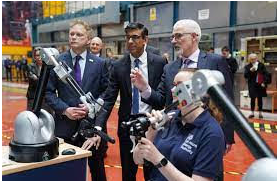
Here’s why Britain is joining a trans-Pacific trade pact- After its exit from the European Union, Britain decided on Friday to join the Comprehensive and Progressive Agreement for Trans-Pacific Partnership (CPTPP), a trade agreement centred on the Pacific Ocean.
These are some specifics of the pact as Britain looks to negotiate post-Brexit trade deals with far-off but rapidly expanding economies.
11 nations, including Australia, Brunei, Canada, Chile, Japan, Malaysia, Mexico, New Zealand, Peru, Singapore, and Vietnam, reached an agreement on the CPTPP free trade agreement (FTA) in 2018.
The partnership will welcome Britain as its first new member since it was founded, making it the 12th member overall.
Once Britain joins, the CPTPP countries’ combined GDP will be $13.6 trillion, or 15% of the world’s GDP. According to the office of Prime Minister Rishi Sunak.
Because there is no single market for products or services, unlike the European Union. Whose trade circle Britain exited at the end of 2020, regulatory harmonisation is not necessary.
According to Britain, exports to CPTPP nations were value 60.5 billion pounds in the year that ended in September 2022.
Long-term membership will bring an additional 1.8 billion pounds each year, and maybe more if other nations join.
Nevertheless, when talks began in 2021, Britain claimed in an effect assessment of the accord that it is expect to boost GDP by just 0.08% over the long run.
Only Malaysia and Brunei are not cover by current FTAs. According to David Henig, Director of the UK Trade Policy Initiative. And they only account for 0.33% of UK trade.
Sam Lowe, Partner at Flint Global, claimed that exporters might gain from CPTPP participation. Even while doing business with nations that have bilateral free trade agreements.
Exporters must prove that a product contains a certain percentage of “locally” sourced components. In order to qualify for preferential tariffs.
Exporters may count EU inputs as “local” under the rules of origin in rolled-over post-Brexit free trade agreements with Japan, Mexico, and Canada, for example.
Nonetheless, the CPTPP gives exporters another choice if it is advantageous because inputs from CPTPP members are typically regarded as local.
Optionality is the tangible advantage for UK exporters, according to Lowe.
Although Britain agreed to a quota on beef imports, it refused to relax food standards, which forbid hormone-treated meat.
In response to proposals from Peru, Vietnam, and Singapore, respectively. Britain also agreed to lower tariffs on bananas, rice, and crab sticks. Tariffs on Malaysian palm oil would also be liberalise:
The United Kingdom emphasised that zero tariffs would apply to 99% of exports to the CPTPP. Including those of cheese, automobiles, chocolate, machinery, gin, and whisky.
Mark Kent, Chief Executive of the Scottish Whisky Association, hailed the gradual reduction of Malaysia’s 165% whisky tariff. And noted that “the UK’s entrance to CPTPP would open up new prospects for Scotch Whisky and other UK products in major markets in the area.”
